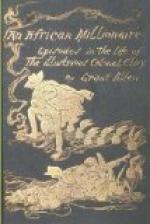“I hardly know whether I’m exactly the man to make the hero of a novel,” Charles murmured, with complacence. And he certainly didn’t look it.
“I was thinking rather of Colonel Clay as the hero,” the poet responded coldly.
“Ah, that’s the way with you men of letters,” Charles answered, growing warm. “You always have a sneaking sympathy with the rascals.”
“That may be better,” Coleyard retorted, in an icy voice, “than sympathy with the worst forms of Stock Exchange speculation.”
The company smiled uneasily. The railway king wriggled. Wrengold tried to change the subject hastily. But Charles would not be put down.
“You must hear the end, though,” he said. “That’s not quite the worst. The meanest thing about the man is that he’s also a hypocrite. He wrote me such a letter at the end of his last trick—here, positively here, in America.” And he proceeded to give his own version of the Quackenboss incident, enlivened with sundry imaginative bursts of pure Vandrift fancy.
When Charles spoke of Mrs. Quackenboss the poet smiled. “The worst of married women,” he said, “is—that you can’t marry them; the worst of unmarried women is—that they want to marry you.” But when it came to the letter, the poet’s eye was upon my brother-in-law. Charles, I must fain admit, garbled the document sadly. Still, even so, some gleam of good feeling remained in its sentences. But Charles ended all by saying, “So, to crown his misdemeanours, the rascal shows himself a whining cur and a disgusting Pharisee.”
“Don’t you think,” the poet interposed, in his cultivated drawl, “he may have really meant it? Why should not some grain of compunction have stirred his soul still?—some remnant of conscience made him shrink from betraying a man who confided in him? I have an idea, myself, that even the worst of rogues have always some good in them. I notice they often succeed to the end in retaining the affection and fidelity of women.”
“Oh, I said so!” Charles sneered. “I told you you literary men have always an underhand regard for a scoundrel.”
“Perhaps so,” the poet answered. “For we are all of us human. Let him that is without sin among us cast the first stone.” And then he relapsed into moody silence.
We rose from table. Cigars went round. We adjourned to the smoking-room. It was a Moorish marvel, with Oriental hangings. There, Senator Wrengold and Charles exchanged reminiscences of bonanzas and ranches and other exciting post-prandial topics; while the magazine editor cut in now and again with a pertinent inquiry or a quaint and sarcastic parallel instance. It was clear he had an eye to future copy. Only Algernon Coleyard sat brooding and silent, with his chin on one hand, and his brow intent, musing and gazing at the embers in the fireplace. The hand, by the way, was remarkable for a curious, antique-looking ring, apparently of Egyptian or Etruscan workmanship, with a projecting gem of several large facets. Once only, in the midst of a game of whist, he broke out with a single comment.




